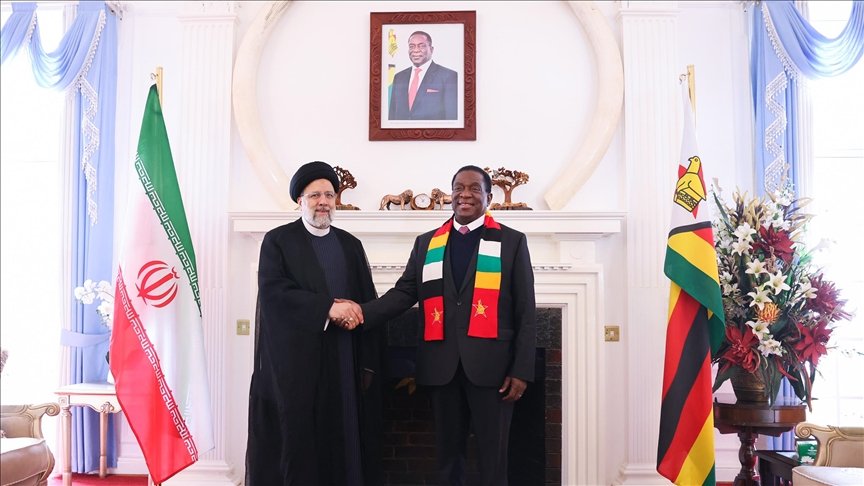Iran has had enduring diplomatic relations with several nations in Africa, particularly in southern Africa, exemplified by the longstanding Zimbabwe-Iran connection. In a recent development, Iran has taken a significant step by providing visa-free access to 32 countries including Zimbabwe. Ezzatollah Zarghami, the Iranian Minister of Cultural Heritage, Tourism, and Handicrafts, announced that the Iranian Cabinet has unilaterally decided to abolish visa requirements for visitors from India. This decision, disclosed after a cabinet meeting on Wednesday, is part of Iran’s strategic initiative to stimulate tourism influx and attract travellers from a diverse range of nations globally.
In July of this year, the President of Iran visited Zimbabwe, marking a significant step in strengthening bilateral relations between the two nations. During his three-country African tour, Iranian President Ebrahim Raisi and Zimbabwean President Emmerson Mnangagwa signed a total of 12 agreements, highlighting their commitment to cooperation.
Upon Raisi’s arrival at Robert Mugabe International Airport in Harare, President Mnangagwa warmly welcomed him as “my brother,” emphasizing the historical ties between the two countries. Mnangagwa recounted Iran’s support during Zimbabwe’s struggle for independence, stating, “When we went to war, Iran was our friend. I am happy you have come to show solidarity.”
The welcoming scene was adorned with banners, and a diverse crowd, including members of Zimbabwe’s Muslim community, gathered to witness the leaders’ meeting. Mnangagwa, addressing the crowd, stressed the interconnectedness of their nations, saying, “When you see him, you see me. When you see me, you see him.”
The 12 agreements, signed later in the day, span various sectors, reflecting the comprehensive nature of the collaboration. Among these agreements is the establishment of a tractor manufacturing plant in Zimbabwe through a partnership between an Iranian company and a local entity. Other areas of cooperation include energy, agriculture, pharmaceuticals, and telecommunications, as well as joint research, science, and technology projects.
Both Iran and Zimbabwe face challenges due to United States sanctions, making this diplomatic initiative particularly crucial for both nations. President Raisi’s African tour, which also included stops in Kenya and Uganda, is part of Iran’s broader strategy to strengthen diplomatic ties and alleviate international isolation.
Raisi expressed optimism about the collaboration, stating, “Our cooperation with Zimbabwe and our engagement with the African continent, which is a continent full of potential, could help us for mutual advances.” Meanwhile, President Mnangagwa welcomed investments from Iran in various sectors of the Zimbabwean economy, though specific details about the expected investment were not disclosed.
Iranian foreign ministry spokesman Nasser Kanani highlighted the significance of Raisi’s tour, describing it as “a new turning point” that could enhance economic and trade relations with African nations. Kanani also emphasized “common political views” shared between Iran and the three African countries. In addition to Zimbabwe, Iran signed agreements with Kenya and Uganda during the tour.
This African tour follows President Raisi’s June visit to three Latin American countries—Cuba, Nicaragua, and Venezuela—all of which are also subject to US sanctions. Notably, this visit marks the first by an Iranian leader to Zimbabwe since 2010 when then-President Mahmoud Ahmadinejad visited the country.
Iranian Minister of Cultural Heritage, Ezzatollah Zarghami said efforts to boost tourism can neutralise Iranophobia campaigns. Recently Malaysia, Sri Lanka and Vietnam have waived Visa requirements for Visitors from India. India has one of the fastest-growing markets for Outbound Tourism India with a recent McKinsey analysis showing 13 million outbound Indian tourists in 2022.
The 33 countries approved for Iran’s new visa-waiver program are as follows: India, Russia, United Arab Emirates, Bahrain, Saudi Arabia, Qatar, Kuwait, Lebanon, Uzbekistan, Kyrgyzstan, Tajikistan, Tunisia, Mauritania, Tanzania, Zimbabwe, Mauritius, Seychelles, Indonesia, Darussalam, Japan, Singapore, Cambodia, Malaysia, Vietnam, Brazil, Peru, Cuba, Mexico, Venezuela, Bosnia and Herzegovina, Serbia, Croatia and Belarus.










